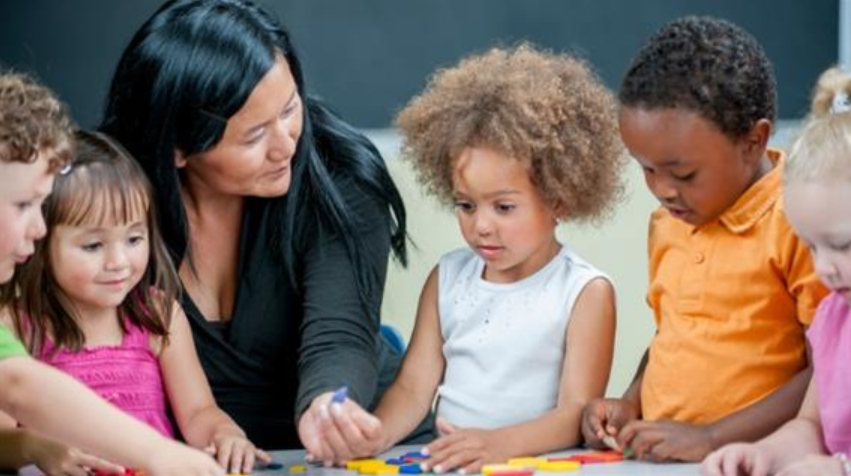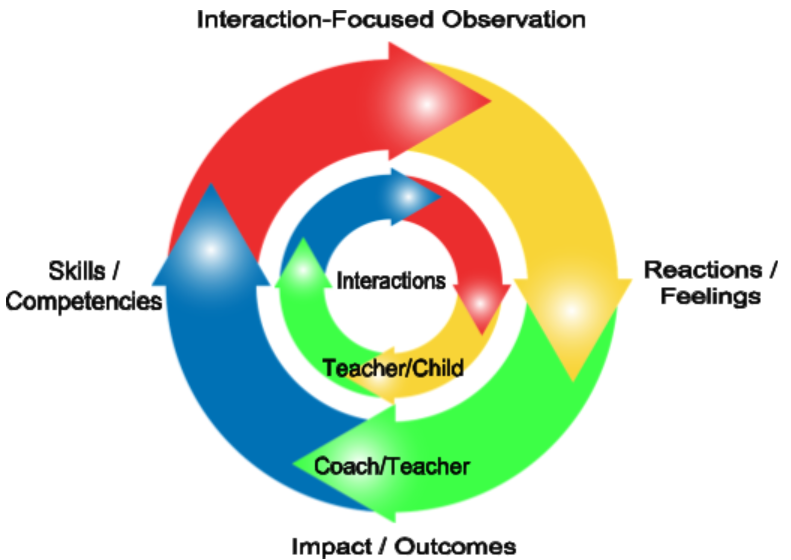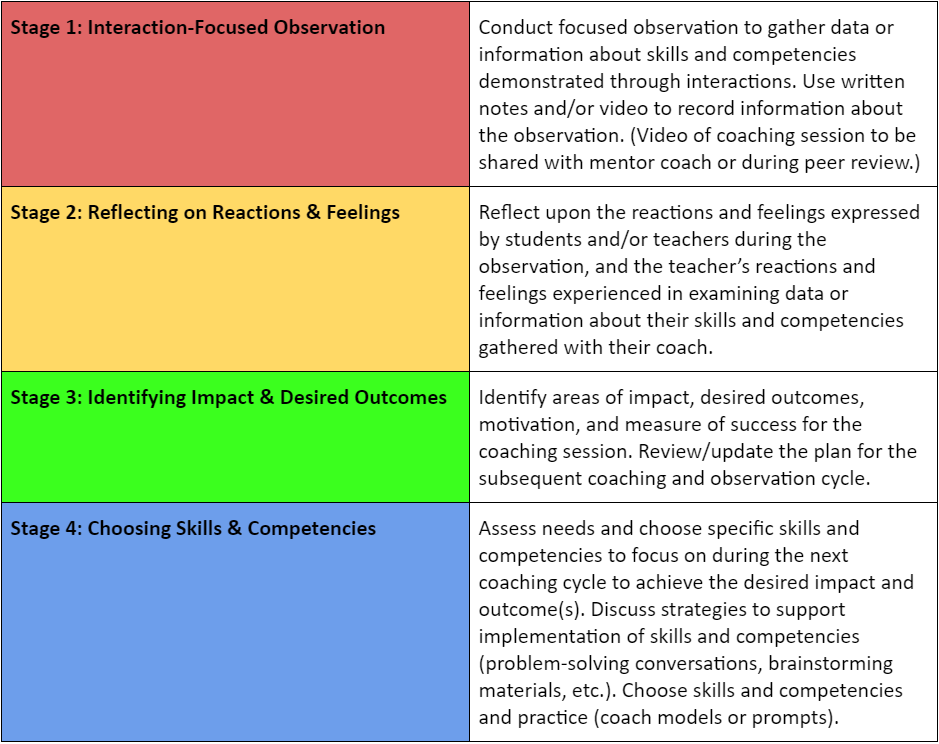A Coaching Model Created by Nathan Johnston
(Educational Leadership Coach, UNITED STATES)

A Practiced based model for improving processes and outcomes in education
Introduction
Interaction-Focused Coaching (IFC) is a Practice-Based Coaching Model for improving education outcomes for students in their learning environment. It is a cyclical process in which teachers work with a coach to develop competency in facilitating student/teacher interactions that mirror the interactions that promote their own learning and skill development in the coaching relationship. The coaching cycle stages are:
- Interaction-Focused Observation
- Reflecting on reactions and feelings
- Identifying impact and desired outcomes
- Choosing skills and competencies
The coach’s role in IFC is to model the same skills and competencies in their interactions with teachers that teachers will use to promote learning interactions with their students. Each stage of the coaching cycle is designed to help the teacher plan how to build on the previous stage in an intentional way. The coach and teacher create a shared understanding of interactions by reflecting upon the meaning of their reactions and feelings about what their observations, identifying their impact and significance, and choosing skills and competencies to focus on in the next interaction-focused observation and coaching cycle.

Parallel Process
Although interactions observed between teachers and students serve as the primary focus of the IFC model, the coach is also engaged in modeling the very skills and competencies the teacher will use to facilitate learning with their students. The coach and the teacher are engaged in what is called a parallel process, where the quality of their interactions will be reflected in the quality of the teacher’s interactions with their students.
The interaction-focused coach has to be focused on more than the interactions observed between the teacher and their student. They also have to be focused on the skills and competencies they are modeling in order to specifically name them, and explicitly share the experience with the teacher using a meta-cognitive approach.
The outer circle represents the process by which a coach can draw attention to their interactions with the teacher as a way of modeling how the process works. This works especially well when the coach has their own coach to help them move through each stage in the coaching cycle themselves.
Interaction-focused coaching can be used with anyone who facilitates learning interactions. The object is for facilitators of learning to develop an awareness of the relationship between giving and receiving so they can become more intentional in the process of developing skills and competencies in others.
Establishing the Coaching Agreement
Prior to the start of coaching, written permission must be obtained to take notes and use video to record interactions between the teacher and students. Parameters of the relationships between the coach, teacher, and any supervisor should be clear to all including information about fees, scheduling, and guidelines for sharing information discussed in coaching sessions.
During the introductory session, the coach describes their role as coach and the teacher’s role in coaching to make sure that expectations are clear about what coaching is and is not, what each person can expect, and what each person is responsible for in the coaching relationship.
Coach’s Role
Teacher’s Role
Implementation
At the conclusion of the introductory session, the teacher reviews the Implementation stages below, selects a focus area for the initial coaching cycle, determines an outcome they hope to achieve, discusses their motivation for achieving that outcome, and determines objective behaviors/subjective feelings they would consider to be evidence of a successful coaching outcome.
Stage 1: Interaction-Focused Observation
Conducting observations that focus on specific skills and competencies to support learning interactions is the first stage of the Interaction-Focused Coaching model. The term “observation” refers to the process of gathering and recording information about how skills and competencies are practiced within teacher/student interactions throughout the day. Interaction-focused observations seek to gather and record information about teachers’ practicing the skills they have chosen to develop and improve. The information gathered is specific to the behaviors the teacher has chosen to focus on instead of a more general classroom observation. For example, if a teacher chooses to focus on developing their students’ awareness of the impact of their positive behaviors, the coach might focus on how the teacher practices reflecting with students’ on their behavior with positive, descriptive acknowledgement.
Stage 2: Reflecting on Reactions & Feelings
Following interaction-focused observation, the next stage of the Interaction-Focused Coaching model is a coaching conversation where the coach explores the teacher’s immediate reactions and emotional responses to the observation process. The purpose of reflecting on the the teacher’s immediate reactions and feelings is to identify any associations or memories from the process of being observed that may be influencing their implementation of desired behaviors, skills, and competencies.
Stage 3: Identifying Impact & Desired Outcomes
The third stage of the Interaction-Focused Coaching model is for the coach to help the teacher identify what they would like to focus on in the coaching session and confirm whether the teacher still intends to explore the area of focus determined prior to the observation, or has some other focus for the coaching conversation in mind.
The coach works with the teacher to describe a desired outcome for the coaching conversation by identifying the impact they think their behaviors are having so they can determine their desired outcome(s) for the coaching session. The coach helps the teacher reflect on their motivation and why the outcome they chose is important for their success. The teacher determined how they will know when they have achieved success, what success will look like, and how it will be measured.
Stage 4: Choosing Skills & Competencies
The final stage of the Interaction-Focused Coaching model involves bringing closure to the session by choosing skills and competencies that build on the impact and outcome achieved through coaching to practice in the next cycle of interaction-focused observation. The coach guides the teacher (using the same skills and competencies that the teacher will use with their student) in identifying behaviors from the focus areas outlined below:
Focus on Emotional Climate:
Focus on Efficacy:
Focus on Impact:
Focus on Feedback loops:
Focus on Reflection and Application:
How does the coaching cycle continue?
The focus, outcomes, motivation, and measures of success are reviewed and updated with every cycle, and at each stage of the Interaction-Focused Coaching model as needed. The focus of coaching changes as new priorities are identified, and may include more than one behavior or focus area at a time.
Summary
A summary of the processes involved in each stage of the IFC model is described in the following table. Taken together, all stages help a coach or teacher achieve desired outcomes for improvement or refinement of interactions that promote learning practices.
Interaction-Based Coaching Stages At-a-Glance:

References
International Coach Federation. (n.d.). ICF Core Competencies Rating Levels. https://coachfederation.org/app/uploads/2017/12/ICFCompetenciesLevelsTable.pdf. Lexington, KY.
Office of Head Start, The National Center for Quality Teaching & Learning. (n.d.). Practice Based Coaching Collaborative Partnerships. https://eclkc.ohs.acf.hhs.gov/sites/default/files/pdf/pbc-handout.pdf. Washington, D.C.
Owens, M. (2018). How do you promote teacher’s growth? Learn about the parallel process. https://info.teachstone.com/blog/how-do-you-promote-teachers-growth-learn-about-parallel-process. Teachstone Training, Charlottesville, VA.
Pianta, R. C., La Paro, K. M., & Hamre, B. K. (2008). Classroom assessment scoring system (CLASS) manual, pre-K. Baltimore, MD: Paul H. Brookes Pub. Co.
Teachstone. (2018). CLASS group coaching (MMCI): Coach guide. Charlottesville, VA.
<<Find out more about how to create your own Coaching model at ICA>>
Your Coaching Model reflects your values, Read more about creating your own coaching modelLearn How to Create Your Own Coaching Model
philosophies and beliefs and must communicate who you will coach
and the problems you will solve.